Sunday, 21. January 2007
Stories from South America. Back north
The last days in hot and sunny north again. No stories to tell this time. Waving good-bye to Chile from the top of Cerro St. Cristobal. And twenty-seven hour' journey from Santiago to the Boston airport... The rest of the pictures from the trip are here - http://picasaweb.google.com/ieva.jusionyte/ChileArgentina
The last evening in Patagonia, eating parrilla de lomo...
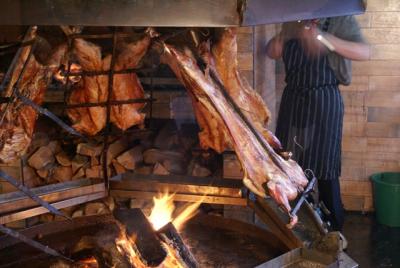
The last day in central Chile... visit to Undurraga vineyard somewhere by the old wine valley...
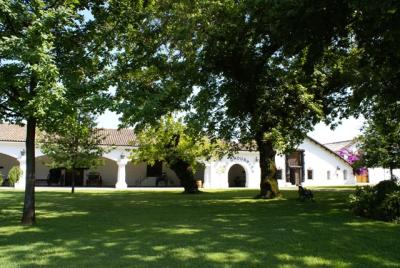
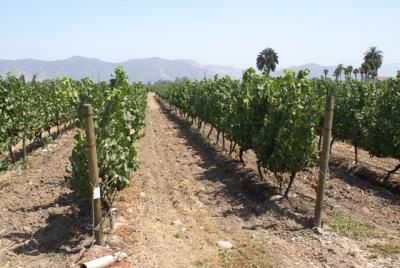
Pinot Noir grapes...
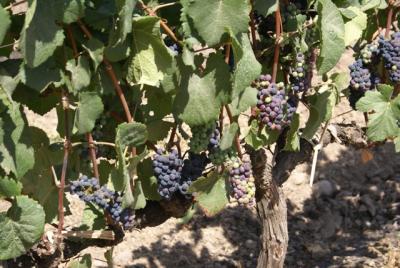
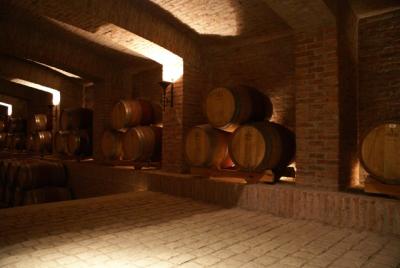
The last evening over the smoggy Santiago...
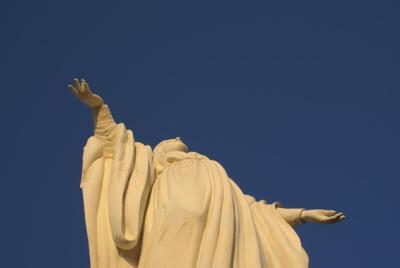
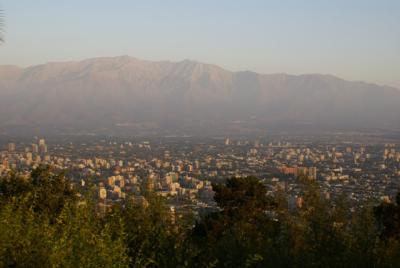
The last hours downtown... watching the changing of la Guardia near the President's office...
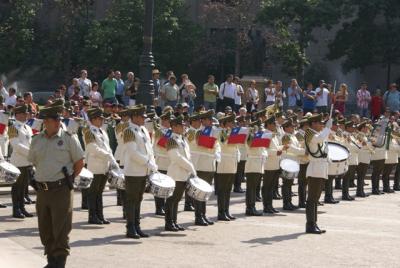
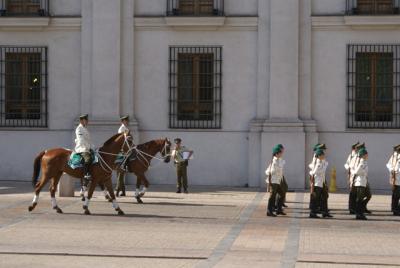
Hasta luego, America del Sur!
The last evening in Patagonia, eating parrilla de lomo...

The last day in central Chile... visit to Undurraga vineyard somewhere by the old wine valley...


Pinot Noir grapes...


The last evening over the smoggy Santiago...


The last hours downtown... watching the changing of la Guardia near the President's office...


Hasta luego, America del Sur!
ieva jusionyte, 12:20h
... link (0 Kommentare) ... comment
Wednesday, 17. January 2007
Stories from South America. The Beagle Channel
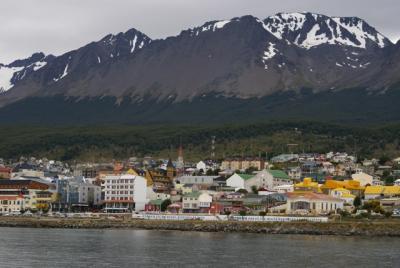
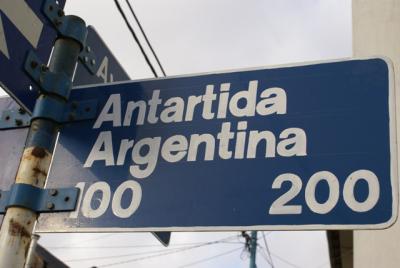
The first European to "discover" Tierra del Fuego in 1520 was Ferdinand Magellan who gave the island this name because, as the legend goes, he thought he was seeing many fires lit by indigenous Fuegians and was scared that they want to attack his fleet. Later on, however, all the locals - Alacaluf, Yamana, Ona and other tribes - disappeared due to the illnesses and the last remaining Yamana now lives in Navarino island, south of the Isla Grande.
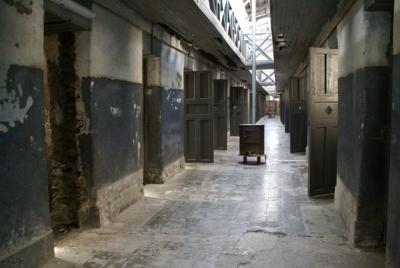
Like most remote islands or even continents in the world Tierra del Fuego was originally a prison and some well-known Argentinian political prisoners that opposed military rule were held here.
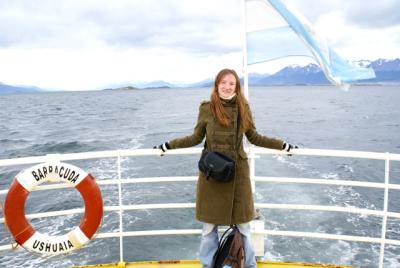
From Ushuaia I set out in the oldest boat carrying tourists in these waters - Baracuda - to explore the Beagle Channel. The channel is so named after capitain Robert FitzRoy's ship that surveyed the coasts of Tierra del Fuego archipelago in early 19th century. Actually, the ship also had Charles Darwin onboard. And he did have what to admire here... Two days among sea lions, cormorans, penguins and albatrosses... I hadn't known that out of 21 species of albatrosses, these amazing seabirds that can travel for miles on end without landing, 19 species are near extinction and that is a lot due to long-line fishing... http://www.savethealbatross.net/ Unfortunately, I did not see any orcas or whales, but they are out in the open Atlantic waters at this time of year. The wind was freezing, but with a group of Italians I had to endure that outside as the inside cabin was full of sick people... the waves rocked the boat for hours. The place is of severe beauty...
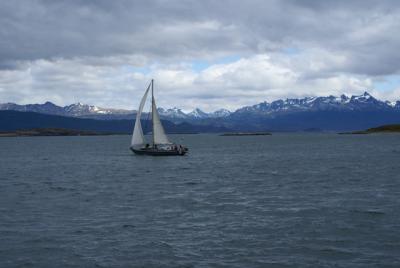
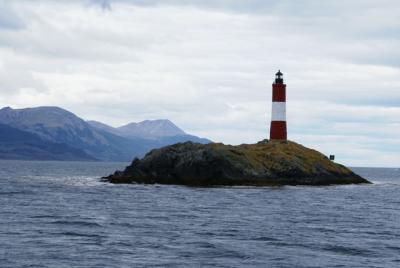
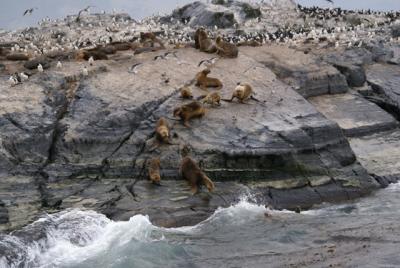
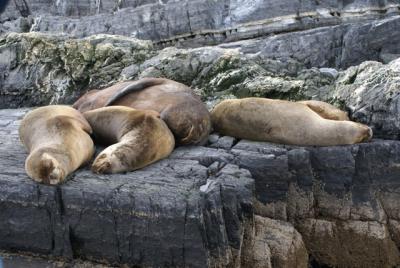
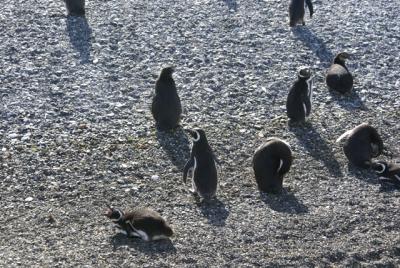
Ships from here to Antarctida cost from two to five thousand dollars for a ten day trip. Not that far and not so impossible:)
ieva jusionyte, 17:01h
... link (2 Kommentare) ... comment
Sunday, 14. January 2007
Stories from South America. Tierra del Fuego
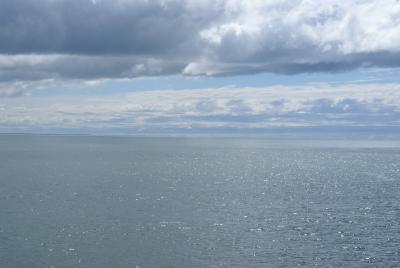
The wind was cold and strong when we crossed the blue waters of the strait of Magellan to set the feet on the shores of Tierra del Fuego, the Land of Fire.
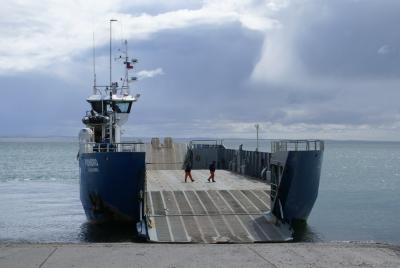
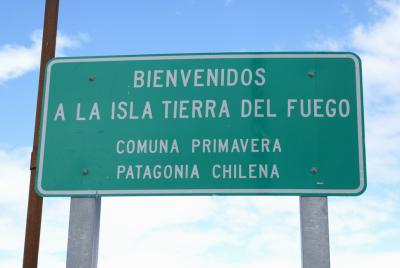
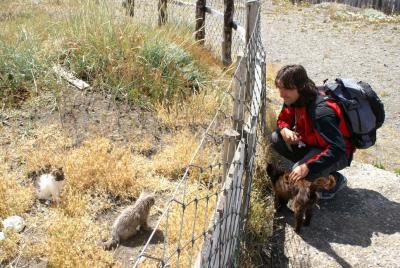
On the right side there was a small wooden hut with a cafe inside and cats all around. On the other - a mine field, full of red flags warning not to advance any further, probably a reminder of the war between Argentina and Chile. It was here, just after leaving the ferry, that our ´Pacheco´ company bus first broke down. They only had to change the tire, though, and we moved on across the steppe... barren wasteland with patches of grass here and there, some sheep and guanacos, some nandu and horses in no man´s land... later there was absolutely nothing at all on both sides of the dusty road, not even paved. Not a single bush for kilometers on end. It then turned out that my companion, peacefully sleeping next to me, was a Latvian guy. His name was Mark and he actually lives in Santa Cruz, not that far from San Francisco. It was so amazing! You have to go to Tierra del Fuego to find a Baltic person! And he was so nice that we chatted and chatted...
However, soon after crossing the Argentinian border the bus stopped again. And this time it was for long. So long that after some time I started to write a diary which I will rewrite here:
Hour 1. Neither the driver nor his assistant has explained people what is wrong with the bus, why we stopped in the middle of nowhere. They are looking at the engine and their grim faces are not a sign of relief, though. People have started getting off the bus. Grasslands all around and a winding road. Nothing more. Once Tierra del Fuego was connected to the rest of Patagonia by land, but later it split... Another bus passing us by stopped to help and the driver´s assistant is now gone. Where to? The rumours go that he went to the next village, some fifteen minutes away, to get the broken piece for the engine. Children are running in the fields, laughing loudly, playing, picking flowers, fighting on the grass... others took their cameras and are making pictures... the rest are smoking or just enjoying some freedom. Because freedom it is. Unlimited. And a small adventure.
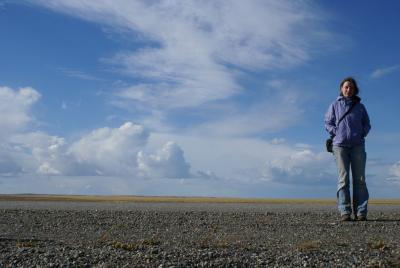
Hour 2. The winds are getting stronger. I remember reading somewhere, maybe in some adventure novels for kids, that to survive in this wind of the steppe you should lie down on the ground. And so I did. The wind is was passing above me, but did not make me cold. I was watching the clouds in the clear blue sky. Smelling the short summer flowers. Collecting some stones for my friends back home... The kids are still playing. Others have gone back to the bus and are reading books. Now I have noticed how many Jewish there are on the bus... reading in Hebrew and chatting in a tongue that I do not understand. Ani lo medaberet ivrit. Mark introduced me to his companions that he met in Buenos Aires, they are also all from Izrael, travelling around South America to set their mind free from three years in the army. Interesting that they always choose either South America, or India, or New Zealand and Australia. A tradition. So we are now sitting in a circle in the grass on the side of the road, talking about Argentinian parrillas and Mendoza wine... shall we hunt some sheep or llamas for dinner?But even they are not here... We left them far behind. Nobody and nothing is here, but a few birds and camions passing by and signaling to greet us. The driver is sleeping in his seat.
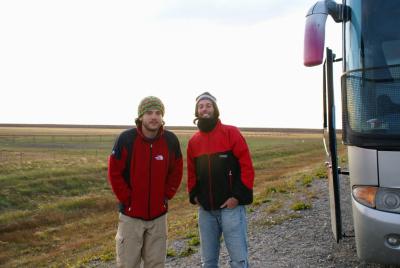
Hour 3. It´s getting late. Well, after eight in the evening. I don´t have a watch, so knowing time is difficult for me these days... The sun is till up, however, it´s summer and only a thousand kilometers to Antarctida... But the wind is now really freezing, it reaches deep to the bones... we are now lying in the steppe to keep warm... Few kids are still out there, singing and dancing in the winds, which are getting stronger and stronger... We are hungry now (shouldn´t have discussed Argentinian cuisine... ). Someone had a thought to cook some food on the stove, maybe some pasta, even if lighting a fire in this wind seemed so improbable and maybe dangerous. But soon these dreams fade away as the driver has no keys of the baggage storage where our backpacks are. It´s all authomatic. No engine - no backpacks. No hitch-hiking. No tents. No sleeping bags. Nothing. And the bus, which goes only every two days here, has no radio to tell of the accident. Not even mentioning that cell phones are out of network at least in this hinterland. Back to the bus to warm up... Someone says: ´I feel like in a horror movie´. Someone else asks: ´Somebody would like to exchange books? I´ve finished mine.´ I am not even sure what time it is now. But why count it? What will be, will be. We have no tents and are short of food and water, but don´t feel that yet and don´t panic. A lady comes to me and says she went to Brandeis (yes I am wearing my campus sweatshirt and in the bus full of Izraelians I am noticed:)). Nice. No more camions are passing by. Evening has come. Eyes are fixed on the horizon trying to spota coming in the distance... with the help for our bus. It is still fun for me as I am not hurrying anywhere, most probably as many of the people. Somebody would even pay for such an adventure. ´Our company offers getting lost in Tierra del Fuego, the end of the world, for forty dollars´. I might buy such a trip, afterall, why not?.. I wonder how long will it still take... getting back to Chile is impossible at night as the ferries are not working and, besides, it is more than seven hours drive and with not a single settlement on the road, except for the border control post. Moving forward to Ushuaia or at least Rio Grande more south from where we are stuck would also take at least several hours. Unbelievable!.. People are now sharing the remaining food supplies. And smokers are running out of cigarettes... Latest news: we are still waiting for someone with the substitute for the broken piece of the engine.
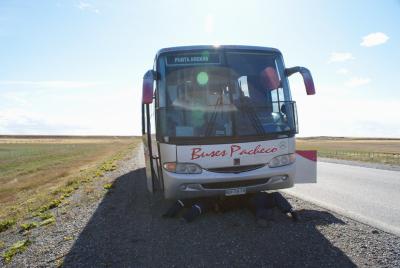
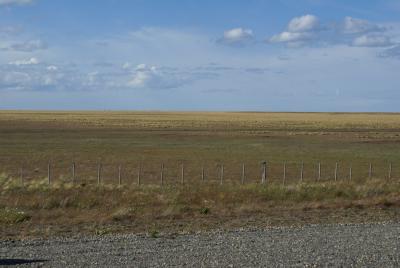
Hour 4. Still no news from the driver´s assistant, so the bus is now holding a forum to come up with a common decision of what is to be done. One person will accompany the driver to Rio Grande by the next car or camion that passes by. They will make contact with some Argentinian bus company that could send a bus to pick us up. One guy insists that they should also bring food for the kids and for women:) And one little girl even volunteers to go with the driver to save the bus... Very nice kids we have on the bus, so patient and happy about the adventure. And so some of us go out to stop the cars... if there were what to stop... stuck in kilometer sessenta. No network. Just the freezing winds... and no cars... Finally one, but full, approaches us. The woman promisses to call for help once she reaches Rio Grande. Nothing more for now. The sun is about to go down... ´I think the sunset will be very beautiful´, one Izraeli guy tells me. We are back in the bus. No more air to breathe here. But too cold outside in the steppe after the sun went down. Yes, the sunset was beautiful and no, my camera did not catch that beauty.
9.50 PM. A camion stopped. But he has only place for one person. The driver went away... We are all by ourselves, waiting for help from everywhere.
10.40 PM. It´s dark, but the sky is still blue and orange and pink and the clouds are floating towards the horizon. Breathtaking views. The wind has ceased for the moment, but the night brings real Antartican cold. We are sitting in the bus (only making occassional walk-outs to take some fresh air) and chatting about travelling, studies in the U.S., Lithuania and Latvia. Mark says his next destination is India and he will work for a year to save up money for that. Again similar idea. Like that of many travellers. I could probably also get a well-paid job and go everywhere I want, but at the same time I want to and I feel I have to come back to Lithuania and do the hard but emotionally rewarding work there... It´s dark in the bus. We don´t have light. Wait a minute, have to find my flashlight, I knew I will need it.
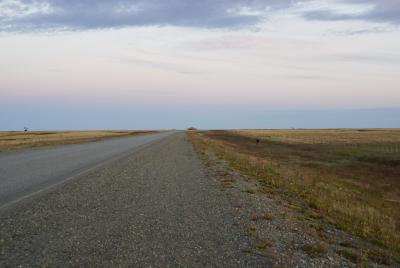
Midnight. Just before midnight we spotted two, later three lights moving in the distance. Imagine how anxiously we waited - and that waiting took dozens of minutes - frightened whenever the lights disappeared behind some hills... And when they finally were near enough we realized that it is not our bus, that the driver, which came back in a taxi from Rio Grande an hour ago had promissed, but just more cars. But the first one stopped. It was the long-forgotten driver´s assistant and he did have the piece we needed to fix the engine. Now they are working on it. Under the starry skies of the freezing island. Hope to move on soon...
Some time later. It is too late to ask someone the time and Mark also doesn´t have a watch. We are moving south across the steppes towards the eternal light of the Antartida. The adventure took something like six hours or more... Only? Time in neverland stops... Good night!
5 AM. The bus stopped on the waterfront in Ushuaia, Argentinian capital of Tierra del Fuego on the southern shores of the island. It was a cold, blue morning, some people still heading home from the bars, some couples kissing on the sidewalk... And it was raining. People who had not booked rooms stayed in the bus to sleep. I found the street of Antartida Argentina and slept for some hours in the friendly ´Antarctida´ hostel, just across the street from two strip clubs.
ieva jusionyte, 16:11h
... link (0 Kommentare) ... comment
Wednesday, 10. January 2007
Stories from South America. Patagonia
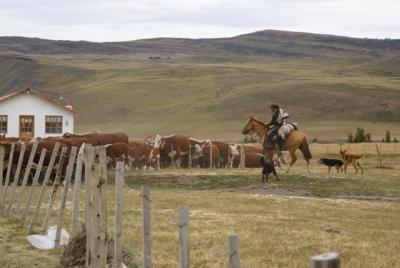
And so I rode out into the wilderness of the southern Patagonia. A real huaso (Chilean counterpart of the Argentinian gaucho), Juan, was my guide in Torres del Paine nacional park, telling me stories of the horses and uncovering the hidden secrets of nature, like magmic formations, berries and birds... On the trip we met not a single human being... only the horses running free in distant valleys... From the horseback (my creolle horse was called Pistola) I watched the condor in its flight over the snowy peaks of the Andes and down the deep valleys, looking for the flesh of the dead... probably sheep or rodents left by the pumas... there I was... galloping across the blossoming grasslands in the infinite hinterland of the pampa... crossing mountain rivers... racing with the rising winds... witnessing an avalanche on Monte Almirante Nieto, that I climbed the day before... sleeping in an old hacienda overlooking las Torres under the starry southern skies... admiring the guanacos, ancestors of the llamas, that were standing proud on the hilltops, their gaze fixed on the unreachable horizon... eating the blue calafate from the bushes... to come back. To Patagonia. The unending steppes, treacherous silent lagunas, majestic mountain ranges, glaciers and fjors... I know it sounds like a romantic novel, but that what it is.
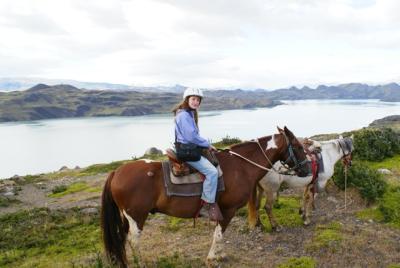
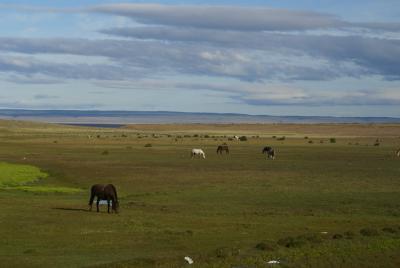
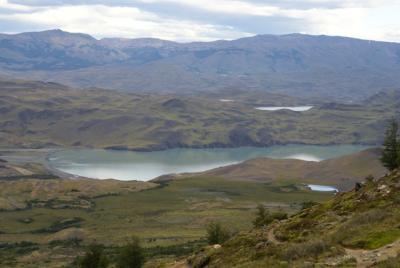
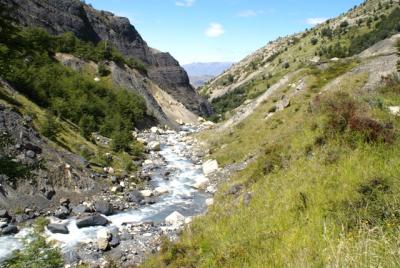
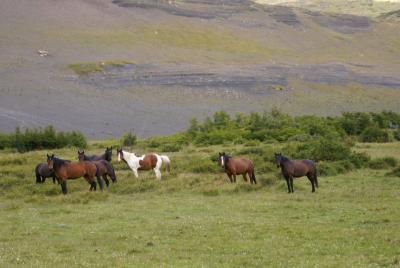
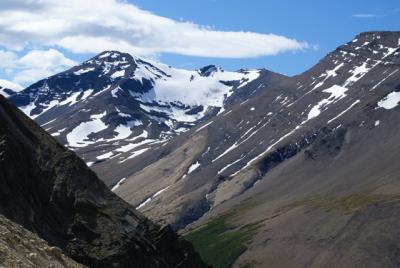
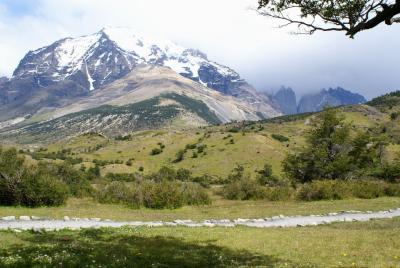
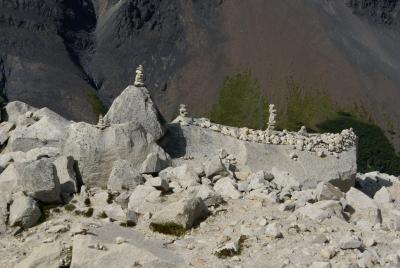
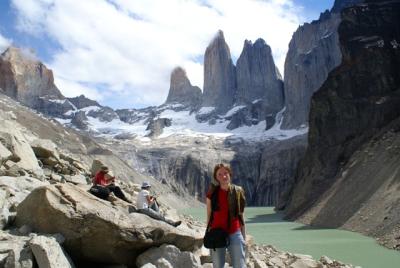
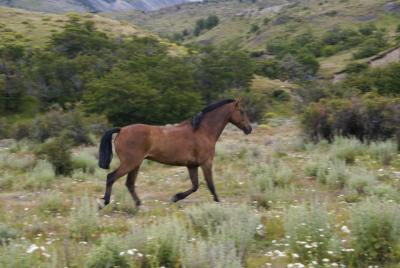
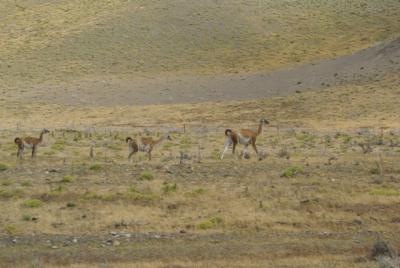
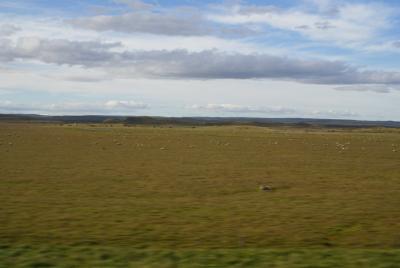
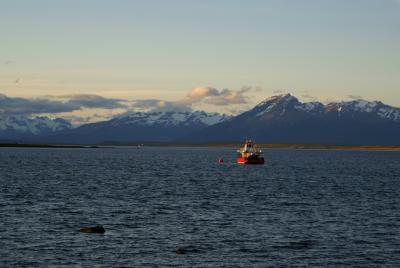
ieva jusionyte, 11:29h
... link (46 Kommentare) ... comment
Saturday, 6. January 2007
Stories from South America. Travellers
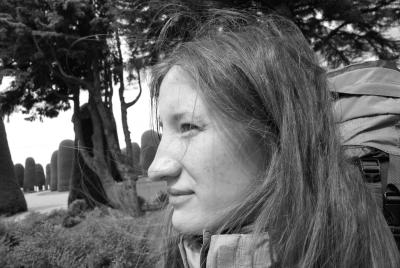
Yesterday night I wouldn´t go to sleep. Chilean wine on the table surrounded by interesting people that I will probably never meet again. Una brasileira, who hasn´t been to the Amazon yet. One New Zealander, who is going from Peru to celebrate the February Carneval in Brazilian Salvador dancing samba. One Japanese girl, working as a teaching assistant in Indiana. One Swiss guy, who has been travelling for eight months already, having started in Guatemala, later spent two months in Colombia and, after the parcel from his mother arrives, is going hiking in Patagonia. Two more Brazilians, one of whom has met a Lithuanian before (not like the rest...). And the last Brazilian with long hair, who is very supportive of Turkey joining the European Union. Come together for one night which could not end... I asked them how do they find so much time to quit everything and just travel around the world... Well, none of them has a lovely job. And before going to such a journey you have to save... although this means so very different things for a Swiss and a Brazilian.
And on your way around the globe you can lose and rediscover yourself. It is a dangerous and exciting way. Not sure whether this is possible for the group of fifty of so Americans that I met on my plane from Santiago to Punta Arenas, Chilean Patagonian capital. They all had golden tags with names and surnames that signified they are part of some expedition heading to the Falkland islands, to M. Pleasant. The ladies had fancy hair-styles ready for a queen´s ball and the gentlemen - ´North Face´ jackets, small digital ´Sony´ cameras and much good spirit to keep smiling all the time till the plane hit the land in the end of the world... not a smooth landing in the winds of the Magellan strait. Guys from ´La Chimba´ hostel call such travellers ´chocolate-box´ tourists as they only pick the postcard views on their way.
I don´t know. Just bought some tortillas, cream cheese, chocolate and water... and in an hour will be heading to the mountains. To meet the pumas and Andean condors. Hopefully, to survive in the wilderness. Anyway, I have a compass and a flashlight, what could happen to me?
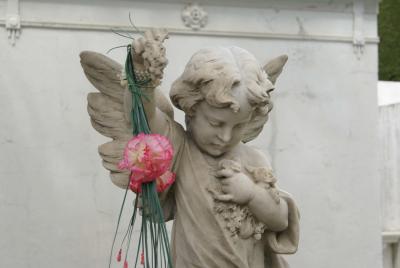
Here in Punta Arenas, the sandy point (and the windy... ) I had alittle walk before moving on to Puerto Natales and the Patagonian wilderness. And what I discovered is that the most beautiful cemetery I have seen in the world is in the end of it... All the sailors and capitans of shipwrecked fleets lie here... from as far as Croatia...
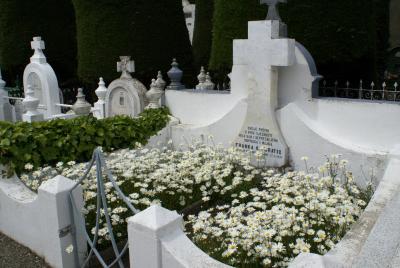
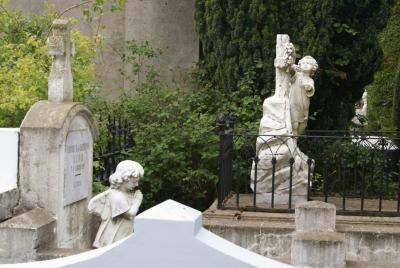
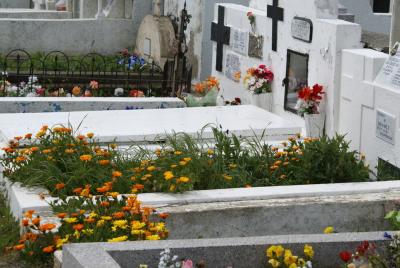
ieva jusionyte, 15:55h
... link (4 Kommentare) ... comment
Stories from South America. Valparaiso
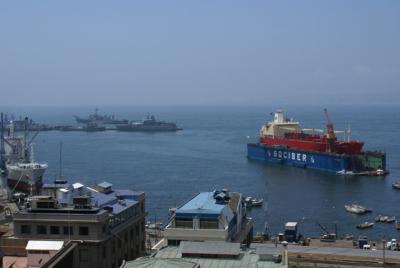
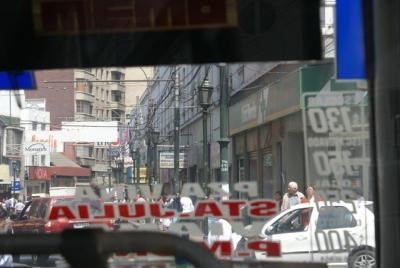
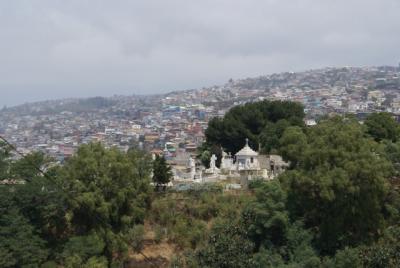
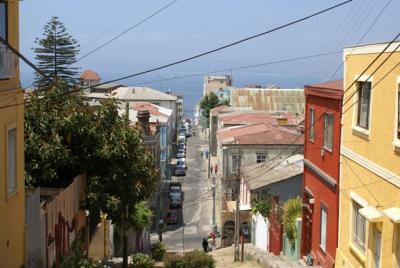
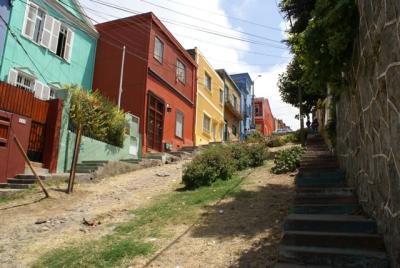
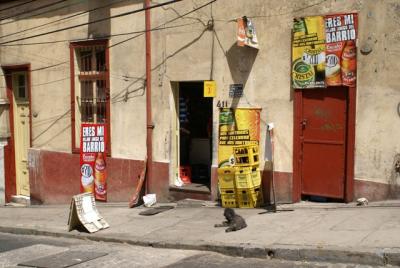
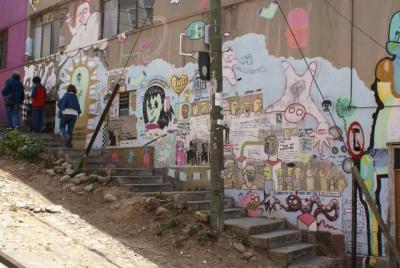
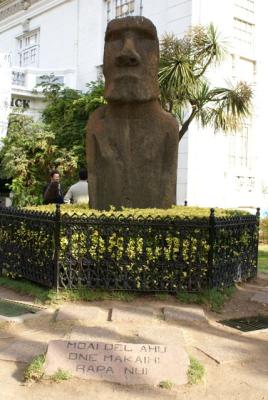
ieva jusionyte, 01:20h
... link (0 Kommentare) ... comment
Friday, 5. January 2007
Stories from South America. Universidad
If anything, Chile is first and foremost heard of when the media reports student protests. They have been doing that during the three-year rule of left-wing Salvador Allende, then they reappeared as resistance to rightist Pinochet´s dictatorship and now, with a pro-socialist divorced mother in power (in a state that is considered rather conservative otherwise), high school students voiced their demands to Michel Bachelet.
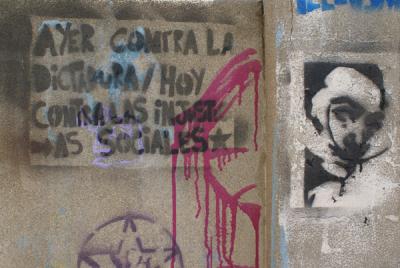
Protests in Chile began in late April and early May with a peak on May 30, when almost eight hundred thousand students went out to the streets in demand for abolishing the fees of college entrance exams, free public transportation and identity cards. However, over the days and nights spent in nearly half of secondary schools throughout the country that were occupied, “the penguins”, who were named after the black and white uniforms that los secundarios wear at school, changed their goals to a complete reform of educational policies in Chile. These efforts have been directed against LOCE (Ley Orgánica Constitucional de Educación) – the last stab of the dictatorship at reforming Chile’s social institutions in 1990. Today in some neigborhood of Valparaiso, definitely labeled ¨NOT FOR TOURISTS¨, I saw some grafitti which said something like ¨The dictator is dead, let´s get away with his constitution¨. Augusto Pinochet died on December 10, 2006, shattering hopes of victims of the regime’s abuses that he would be brought to justice. Seventeen years that he was ruling the country where “not a leave moved if he was not moving it” strongly affected the process of democratizing education and these effects are still felt today as the largest student mobilization since the fall of dictatorship has revealed. This LOCE law is a condensation of neoliberal economic policies applied to educational system. It officially allows anyone who has the money to manage primary and secondary schools; therefore, many prestigious schools are owned by big businesses or religious organizations such as Opus Dei or the Legions pf Christ (in fact, in Chile the democratization of education has always been associated with Protestantism as opposed to hierarchical Catholicism). What is more striking is that these wealthy owners of schools are paid government subsidies per student in attendance at their school and frauds are widespread.
The process of how student demands transformed into a broad upheaval against neoliberal economics is interesting in itself. University students gave lectures to los secundarios about politics that affect the quality of education in Chile in school halls filled with the sound of reggaetón. The protests united los secundarios with their fellows in private schools as well as with university students, the Mapuches, who also struggle for educational reforms, and even workers in the health sector as well as employees of department stores. Because students have been opposing the current system which can be equated with the state, they are often situated under the label of anarchism which ascribes them to a particular niche in the popular culture. Student protesters have to a large extent merged with anarchists, communists, even the indigenous, and, therefore, developed into a broad subcultural movement of the oppressed, where oppressed is anyone who has failed to be incorporated into the unifying national discourse. But the current allegations that the students are antipatriotic and revolutionary or anarchist has a long history. As long back as in mid-1920s university students allied with the anarchists in the demonstrations to complain of nationalism’s debility and to seek a pedagogical solution to Chile’s social conundrum.
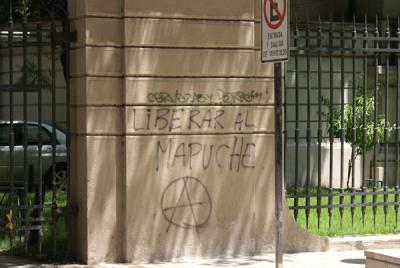
Some insights into the rhetoric of the protests in 2006 would help. For example, a call for a general national strike in a leaflet distributed by the Internationalist Workers’ Party of Chile during the “walkout” of students on June 5 sums up the interrelatedness of student demands with broader social issues:
“For free state education at every level! Down with privately owned education! Free entrance to University! The educational budget must be funded through taxing the big fortunes, refusing to pay the external debt and cutting 80% off the military budget that pays the “gurka” Chilean Armed Forces, lackeys of her the murderous Bush and Blair!
Enough of hostages packing the Pinochetista jails of the civil-military regime! Freedom now for the imprisoned fighting students, for the political prisoners of the Mapuche movement, for all the political prisoners!
As the Chilean students say, “Enough of skyrocketing copper while education is laying on the ground!” The struggle should be for the complete re-nationalization of copper under workers’ control, so that this immense wealth funds free education, workers’ health services, and bread, jobs, living wages for all working people!
The struggle for free and state owned education is the struggle of all the workers and people in Chile!”
Student organizations, such as FECH (Federación Estudiantes Universidad de Chile), have been continuously engaged in the relations of allegiance to the parties. In opposition to the leftist response presented above, that with some modifications was articulated by a number of socialist movements and media sources throughout the world, there was also a right-wing voice that, although dissatisfied with the educational system in general, did not support abolition of fees and other egalitarian aspects of the proposed reforms.
The topic of the March of the Penguins was widely discussed in Chilean and international blogs. Manuel Guerrero Antequera, whose thoughts were reprinted in the opinion section of the Cultura Libre website, writes:
“Así como la lucha contra la dictadura fue llevada adelante por una multiplicidad de fuerzas, por una variedad de cuerpos en resistencia, por un enjambre de identidades en formación, acciones y subjetividades que se disputaban, en forma directa y abierta, el espacio de la política, los estudiantes secundarios de hoy han desbordado las formas de contenido y expresión dictados por quienes creen la única voz autorizada para señalar como ha de vivirse en democracia.”
Although now 95,8 percent of Chilean population over ten years old is literate and over the last decade the number of people with higher education has grown from 9 to 16 percent, education is still connected with structures of inequality. According to some sources, which could not be verified, a survey completed last year found that only 2.1 percent of high school students from municipal schools earned the minimum score required to enter a university on the country’s college entrance exam. The problems are much more complex than articulated by the student leaders in the protests. Students from lower tier schools don’t just lack the few dozens of dollars to pay for entrance exams. They lack the preparation which is necessary to stand a chance at entering a university. Only the smartest are admitted to public universities, like the Universidad de Chile, and only those who have sufficient income dare to attend private colleges, even though officially the loan system claims to be accessible to all. Therefore, even though the concrete minor demands of student protestors have been addressed through negotiations with the Ministry of Education, the strike persisted till autumn due to complexity of students’ demands that developed as the movement expanded to include more and more groups dissatisfied with the present state of affairs.
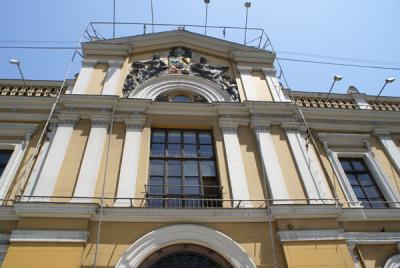
Now it seems over. The students were included in the group that drafted proposals to the government. However, just before officially handing them to the authorities the students quit, saying they disagree and still demand the overall rewriting of the Pinochet´s constitution. The university is also empty, summer hollidays in still hot and smoggy Santiago.

Protests in Chile began in late April and early May with a peak on May 30, when almost eight hundred thousand students went out to the streets in demand for abolishing the fees of college entrance exams, free public transportation and identity cards. However, over the days and nights spent in nearly half of secondary schools throughout the country that were occupied, “the penguins”, who were named after the black and white uniforms that los secundarios wear at school, changed their goals to a complete reform of educational policies in Chile. These efforts have been directed against LOCE (Ley Orgánica Constitucional de Educación) – the last stab of the dictatorship at reforming Chile’s social institutions in 1990. Today in some neigborhood of Valparaiso, definitely labeled ¨NOT FOR TOURISTS¨, I saw some grafitti which said something like ¨The dictator is dead, let´s get away with his constitution¨. Augusto Pinochet died on December 10, 2006, shattering hopes of victims of the regime’s abuses that he would be brought to justice. Seventeen years that he was ruling the country where “not a leave moved if he was not moving it” strongly affected the process of democratizing education and these effects are still felt today as the largest student mobilization since the fall of dictatorship has revealed. This LOCE law is a condensation of neoliberal economic policies applied to educational system. It officially allows anyone who has the money to manage primary and secondary schools; therefore, many prestigious schools are owned by big businesses or religious organizations such as Opus Dei or the Legions pf Christ (in fact, in Chile the democratization of education has always been associated with Protestantism as opposed to hierarchical Catholicism). What is more striking is that these wealthy owners of schools are paid government subsidies per student in attendance at their school and frauds are widespread.
The process of how student demands transformed into a broad upheaval against neoliberal economics is interesting in itself. University students gave lectures to los secundarios about politics that affect the quality of education in Chile in school halls filled with the sound of reggaetón. The protests united los secundarios with their fellows in private schools as well as with university students, the Mapuches, who also struggle for educational reforms, and even workers in the health sector as well as employees of department stores. Because students have been opposing the current system which can be equated with the state, they are often situated under the label of anarchism which ascribes them to a particular niche in the popular culture. Student protesters have to a large extent merged with anarchists, communists, even the indigenous, and, therefore, developed into a broad subcultural movement of the oppressed, where oppressed is anyone who has failed to be incorporated into the unifying national discourse. But the current allegations that the students are antipatriotic and revolutionary or anarchist has a long history. As long back as in mid-1920s university students allied with the anarchists in the demonstrations to complain of nationalism’s debility and to seek a pedagogical solution to Chile’s social conundrum.

Some insights into the rhetoric of the protests in 2006 would help. For example, a call for a general national strike in a leaflet distributed by the Internationalist Workers’ Party of Chile during the “walkout” of students on June 5 sums up the interrelatedness of student demands with broader social issues:
“For free state education at every level! Down with privately owned education! Free entrance to University! The educational budget must be funded through taxing the big fortunes, refusing to pay the external debt and cutting 80% off the military budget that pays the “gurka” Chilean Armed Forces, lackeys of her the murderous Bush and Blair!
Enough of hostages packing the Pinochetista jails of the civil-military regime! Freedom now for the imprisoned fighting students, for the political prisoners of the Mapuche movement, for all the political prisoners!
As the Chilean students say, “Enough of skyrocketing copper while education is laying on the ground!” The struggle should be for the complete re-nationalization of copper under workers’ control, so that this immense wealth funds free education, workers’ health services, and bread, jobs, living wages for all working people!
The struggle for free and state owned education is the struggle of all the workers and people in Chile!”
Student organizations, such as FECH (Federación Estudiantes Universidad de Chile), have been continuously engaged in the relations of allegiance to the parties. In opposition to the leftist response presented above, that with some modifications was articulated by a number of socialist movements and media sources throughout the world, there was also a right-wing voice that, although dissatisfied with the educational system in general, did not support abolition of fees and other egalitarian aspects of the proposed reforms.
The topic of the March of the Penguins was widely discussed in Chilean and international blogs. Manuel Guerrero Antequera, whose thoughts were reprinted in the opinion section of the Cultura Libre website, writes:
“Así como la lucha contra la dictadura fue llevada adelante por una multiplicidad de fuerzas, por una variedad de cuerpos en resistencia, por un enjambre de identidades en formación, acciones y subjetividades que se disputaban, en forma directa y abierta, el espacio de la política, los estudiantes secundarios de hoy han desbordado las formas de contenido y expresión dictados por quienes creen la única voz autorizada para señalar como ha de vivirse en democracia.”
Although now 95,8 percent of Chilean population over ten years old is literate and over the last decade the number of people with higher education has grown from 9 to 16 percent, education is still connected with structures of inequality. According to some sources, which could not be verified, a survey completed last year found that only 2.1 percent of high school students from municipal schools earned the minimum score required to enter a university on the country’s college entrance exam. The problems are much more complex than articulated by the student leaders in the protests. Students from lower tier schools don’t just lack the few dozens of dollars to pay for entrance exams. They lack the preparation which is necessary to stand a chance at entering a university. Only the smartest are admitted to public universities, like the Universidad de Chile, and only those who have sufficient income dare to attend private colleges, even though officially the loan system claims to be accessible to all. Therefore, even though the concrete minor demands of student protestors have been addressed through negotiations with the Ministry of Education, the strike persisted till autumn due to complexity of students’ demands that developed as the movement expanded to include more and more groups dissatisfied with the present state of affairs.

Now it seems over. The students were included in the group that drafted proposals to the government. However, just before officially handing them to the authorities the students quit, saying they disagree and still demand the overall rewriting of the Pinochet´s constitution. The university is also empty, summer hollidays in still hot and smoggy Santiago.
ieva jusionyte, 23:29h
... link (0 Kommentare) ... comment
Thursday, 4. January 2007
Stories from South America. Santiago
I wanted to start the story with the image of landing in Santiago and the feelings the first breath of air in South America, the continent of my dreams from as early as I read ¨The Children of Captain Grant¨, arrose. However, this story has a life of its own and it is not in my hands to control it. And so... I was sleeping in the plane from Miami when suddently i woke up, opened the window to meet the first rays of light with my still closed eyes and saw the Andes... the undending chain of mountains, some covered with snow, their peaks fading in the horizon, others resembling a desert with no life but some bushes and villages clusttered around small streams of water, tiny rivers, flowing out of nowhere in the orange or light brown landscape. And then we landed. Santiago is hot, sunny, smoggy and very dry. Somehow I remember the interesting conversation with Randy about Chileans willing to take Bolivia and Peru´s water supplies... Even the taxi driver (i didn´t mean to take a taxi...) was complaining about that. But later on he switched to a more interesting topic of Chilean wine, nice guys I should find to marry and pisco or pisco sour, the traditional brandy-like drink with lemon juice, according to Randy, also taken from the Peruvians. But let´s leave politics aside at least for the first day I am here... I should go sight-seeing, like the normal tourists do.
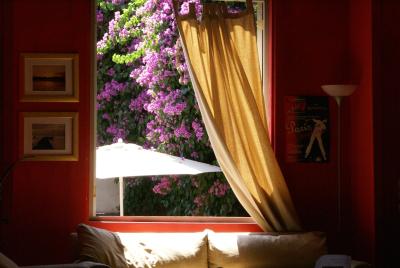
Therefore, I am waiting for Diego at the very cozy hostel in Barrio Bellavista, a neighborhood built by artists, somewhat similar to Uzupis in Lithuania... listening to some relaxing jazz tunes in the presence of Che Guevara and Merilyn Monroe´s photos on the red walls... and thinking which of the books to take... travellers leave a lot of them here... Umberto Eco, Truman Capote, Milan Kundera, Paolo Coelho... there is also a small black dog, sleeping in the shade and running around welcoming every guest. And, sure, there is a Christmas tree, just by the doorway to a blossoming garden. It´s summer in the other end of the world, but still with Santas...
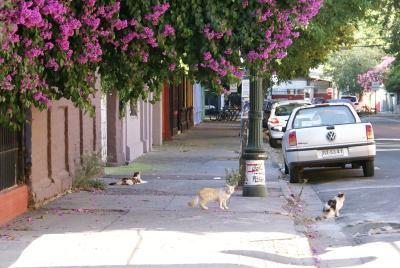
So this is what Diego´s (who is native of Santiago, but normally has little time to explore it) and my day was like in the city of 5 or 6 million inhabitants founded by the Spanish in 1541...
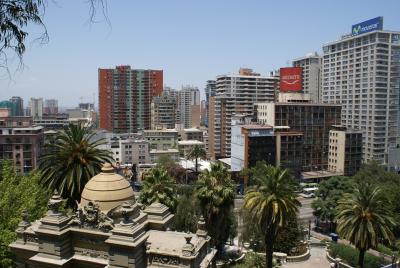
Because of the smog, which stays here forever as the Andes block the winds, the snowy tops of the mountains are not seen in the distance. The ugly modern buildings are from the 1970s. The view from Cerro Santa Lucia, the beginning of Valdivia´s town...
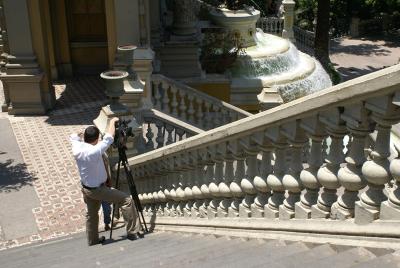
Museo de Bellas Artes...
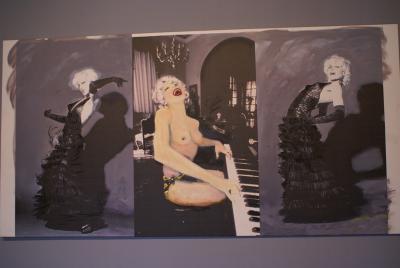
On the way to Universidad de Chile...
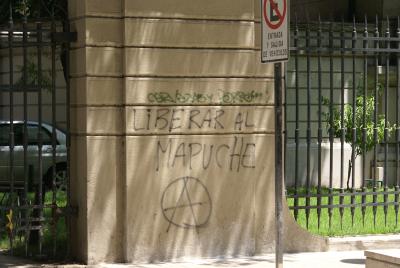
Catedral Metropolitana in the Plaza de Armas, also the first to be populated by the colonists...
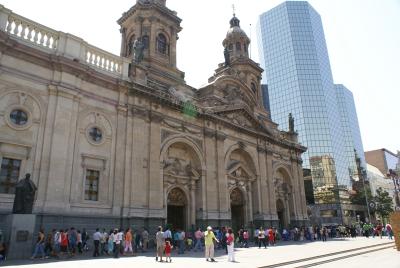
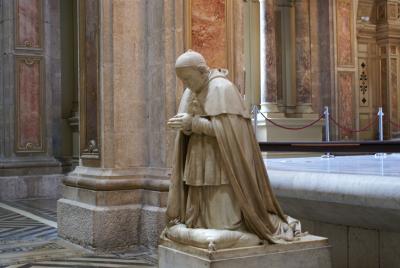
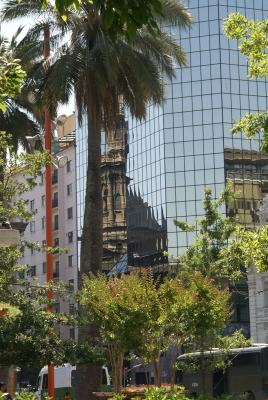
Palacio de la Moneda, where president Michele Bachelet resides. Still guarded, but visitors are welcome after Pinochet´s era...
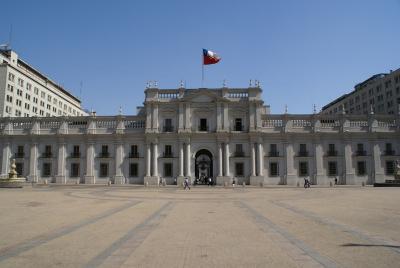
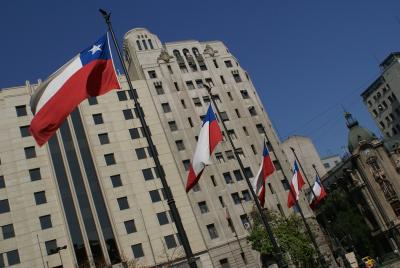
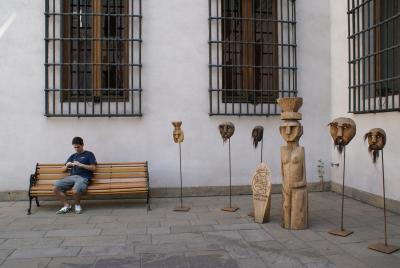
Even the dogs were lazy in 36 degrees Celsius.
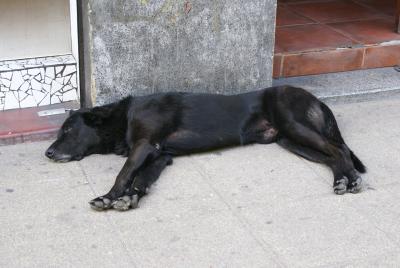

Therefore, I am waiting for Diego at the very cozy hostel in Barrio Bellavista, a neighborhood built by artists, somewhat similar to Uzupis in Lithuania... listening to some relaxing jazz tunes in the presence of Che Guevara and Merilyn Monroe´s photos on the red walls... and thinking which of the books to take... travellers leave a lot of them here... Umberto Eco, Truman Capote, Milan Kundera, Paolo Coelho... there is also a small black dog, sleeping in the shade and running around welcoming every guest. And, sure, there is a Christmas tree, just by the doorway to a blossoming garden. It´s summer in the other end of the world, but still with Santas...

So this is what Diego´s (who is native of Santiago, but normally has little time to explore it) and my day was like in the city of 5 or 6 million inhabitants founded by the Spanish in 1541...

Because of the smog, which stays here forever as the Andes block the winds, the snowy tops of the mountains are not seen in the distance. The ugly modern buildings are from the 1970s. The view from Cerro Santa Lucia, the beginning of Valdivia´s town...

Museo de Bellas Artes...

On the way to Universidad de Chile...

Catedral Metropolitana in the Plaza de Armas, also the first to be populated by the colonists...



Palacio de la Moneda, where president Michele Bachelet resides. Still guarded, but visitors are welcome after Pinochet´s era...



Even the dogs were lazy in 36 degrees Celsius.

ieva jusionyte, 10:55h
... link (2 Kommentare) ... comment